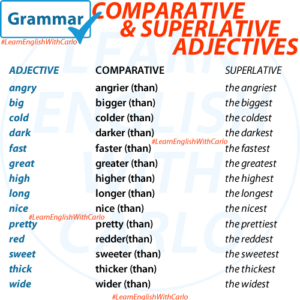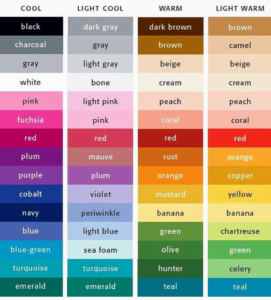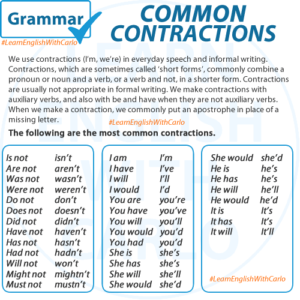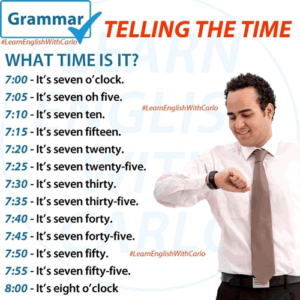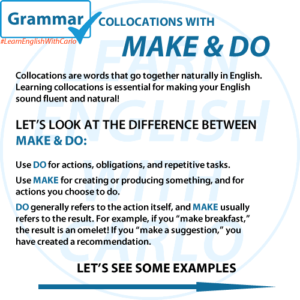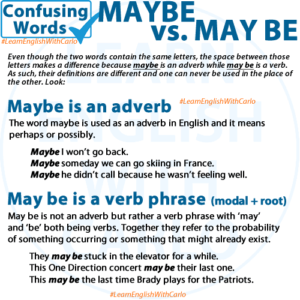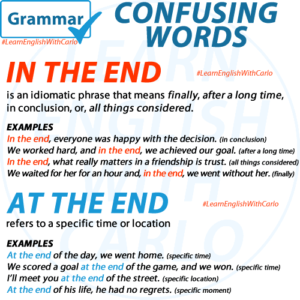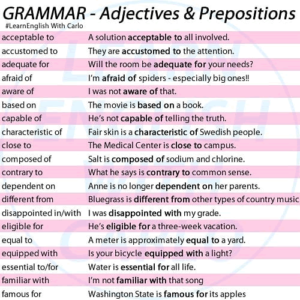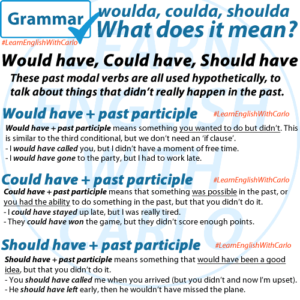Comparative and superlative adjectives are essential tools in English grammar for comparing and expressing degrees of qualities or characteristics. This post will clarify these concepts with clear definitions, examples, and practical applications. GRAMMAR – Comparatives & Superlatives Comparative Adjectives Definition: Comparative adjectives are used to compare two things or people and indicate which has a …
Category: INSTAGRAM
Images I've posted to Instagram
Permanent link to this article: https://englishyourway.com.br/comparative-and-superlative-adjectives/
Oct 09
COLORS
What’s your favorite color? Who knew there were so many colors? And this is only a small sample. Here is a list of the colors shown in the image: If you have any questions or doubts, please ask in the comments or send me a private message. Follow me on Instagram: @englishyourwaybror look for the hashtag …
Permanent link to this article: https://englishyourway.com.br/colors/
Oct 01
GRAMMAR – COMMON CONTRACTIONS
GRAMMAR – COMMON CONTRACTIONS We use contractions (I’m, we’re) in everyday speech and informal writing. Contractions, which are sometimes called ‘short forms’, commonly combine a pronoun or noun and a verb, or a verb and not, in a shorter form. Contractions are usually not appropriate in formal writing. We make contractions with auxiliary verbs, and …
Permanent link to this article: https://englishyourway.com.br/grammar-common-contractions/
Oct 01
GRAMMAR – Telling the Time
GRAMMAR – Telling the Time There are two ways to tell the time in English. The TRADITIONAL British way and the NEWER American way. In the traditional British way, we say the minutes, or portion of an hour (quarter or half), followed by a preposition (past, or to) and then the hour. The US method …
Permanent link to this article: https://englishyourway.com.br/grammar-telling-the-time/
Sep 29
GRAMMAR – Collocations with MAKE & DO
Collocations are words that go together naturally in English.Learning collocations is essential for making your English sound fluent and natural! LET’S LOOK AT THE DIFFERENCE BETWEEN MAKE & DO:Use DO for actions, obligations, and repetitive tasks.Use MAKE for creating or producing something, and for actions you choose to do. DO generally refers to the action …
Permanent link to this article: https://englishyourway.com.br/grammar-collocations-with-make-do/
Sep 28
GRAMMAR – MAYBE vs MAY BE
MAYBE vs MAY BE Even though the two words contain the same letters, the space between those letters makes a difference because maybe is an adverb while may be is a verb. As such, their definitions are different and one can never be used in the place of the other. Look: MAY BE (Verb Phrase) …
Permanent link to this article: https://englishyourway.com.br/grammar-maybe-vs-may-be/
Sep 26
GRAMMAR – AT THE END vs IN THE END
GRAMMAR – AT THE END vs IN THE END English learners often confuse the phrases at the end and in the end because they sound similar. However, their meanings and usage are distinct. Let’s break them down and look at some examples to help you use these phrases correctly. What Does AT THE END Mean? …
Permanent link to this article: https://englishyourway.com.br/grammar-at-the-end-vs-in-the-end/
Permanent link to this article: https://englishyourway.com.br/adjectives-with-prepositions/
Sep 18
Woulda, Coulda, Shoulda – What Does It Mean?
You may have heard native English speakers use phrases like woulda, coulda, or shoulda. But what do they mean? These are informal, spoken forms of would have, could have, and should have. These past modal verbs are used to talk about things that didn’t happen, but that we imagine or wish had been different. Let’s …
Permanent link to this article: https://englishyourway.com.br/woulda-coulda-shoulda/
Sep 15
The Difference Between “Used to” and “Would”
When talking about past habits or repeated actions, learners of English often encounter two phrases: “used to” and “would.” While these two expressions have similarities, they are not interchangeable in every context. Let’s explore their meanings, uses, and differences in detail. What Does “Used to” Mean? “Used to” refers to habits, actions, or states that …
Permanent link to this article: https://englishyourway.com.br/used-to-vs-would/

